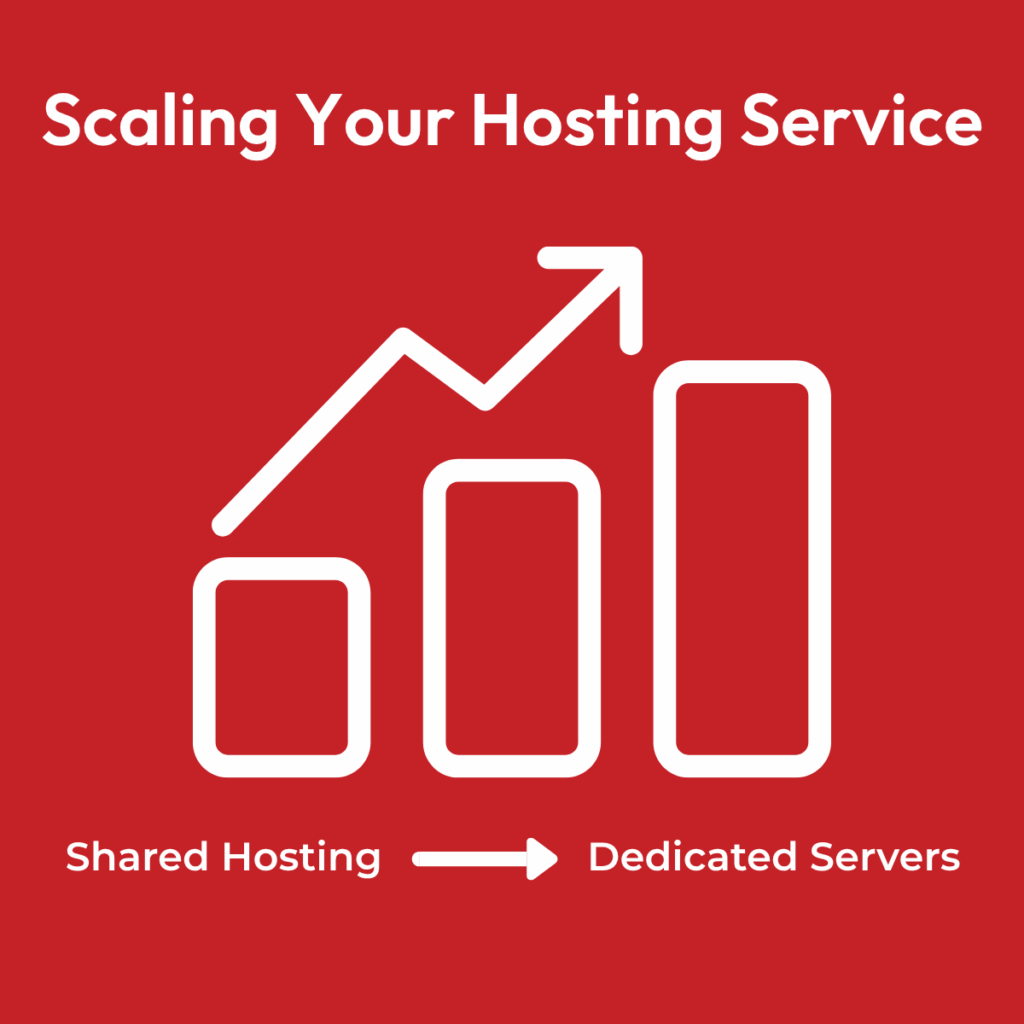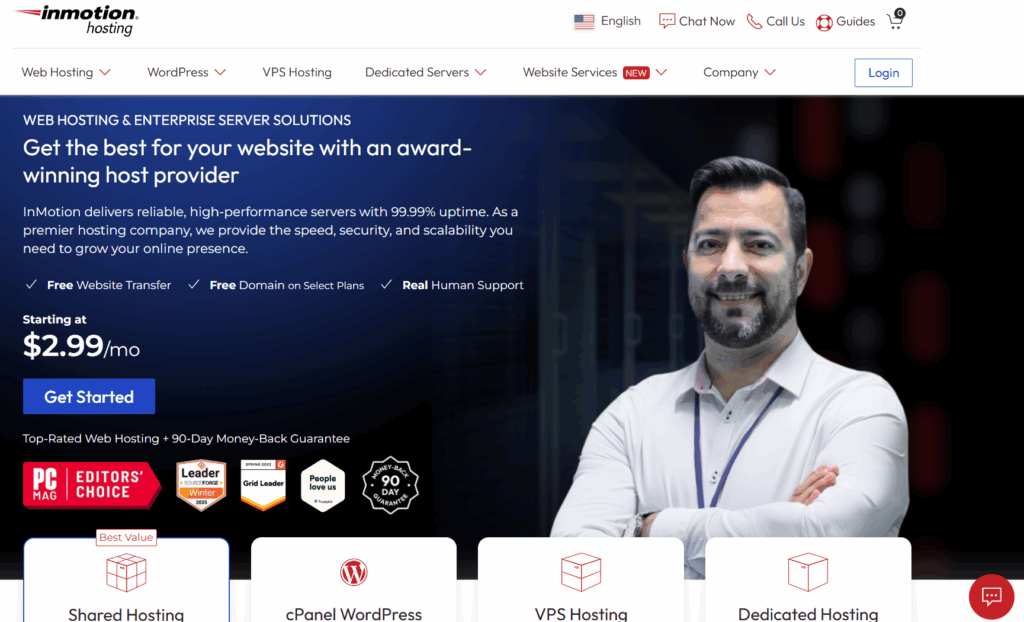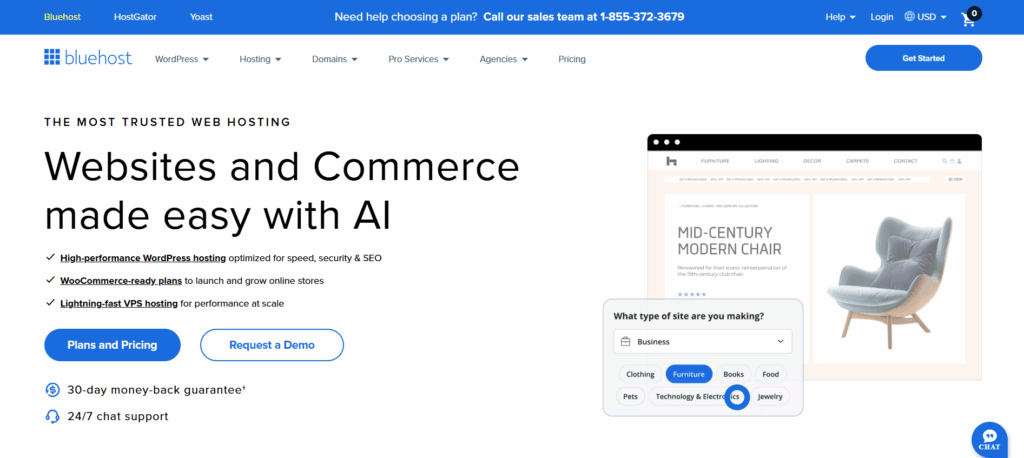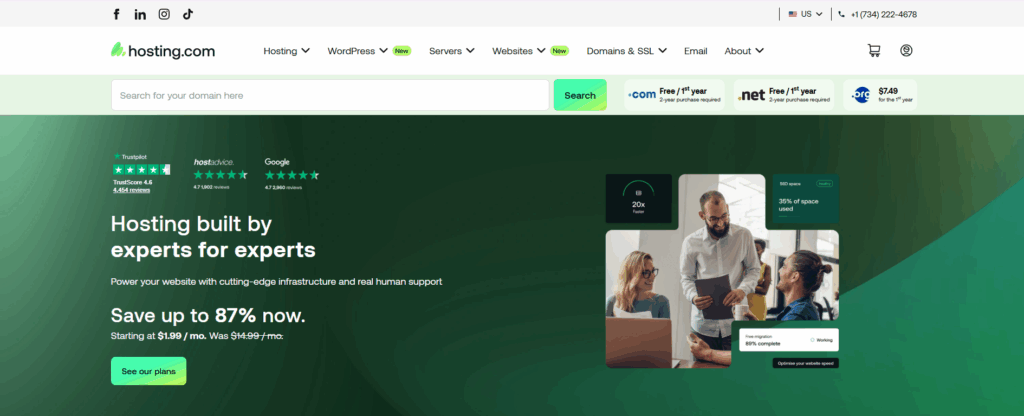Startups need web hosting that balances speed, security, scalability, and support. The right provider ensures your site grows with your business, delivers reliable uptime, and protects customer trust. Investing early in a hosting environment that aligns with your long-term goals sets the foundation for sustainable growth.
Launching a startup is exhilarating. You’re building something new, shaping an idea into reality, and setting the stage for growth. Something every aspiring entrepreneur quickly learns is that behind every successful business lies a critical choice: web hosting. Hosting is the backbone of your brand’s digital home. For startups, selecting the right web hosting partner should be less about checking a box and more about investing in the growth, reliability, and scalability of your vision.
In this guide, we’ll explore why web hosting matters for startups, which features to prioritize, real-world use cases, and practical checklists for entrepreneurs. It is drawn from over two decades of experience supporting entrepreneurs as they grow from the idea phase to a thriving enterprise.
Why Hosting Matters for Startups
When you’re launching a business, it’s easy to focus solely on product development, marketing, and fundraising, while overlooking technical infrastructure. The right web host quietly supports all of these efforts by ensuring your digital presence is reliable, trustworthy, and scalable. It provides the foundation for the success and longevity of your brand. Understanding why web hosting matters will help you make better choices from day one.
Hosting as a Business Foundation
When you’re building a startup, your website is often the first point of contact with customers, investors, and partners. A fast, reliable website signals professionalism and credibility. Downtime or website lagging sends the opposite message. Hosting underpins your reputation: it either reinforces your brand or erodes it before you even get a chance to pitch your product.
For a startup, credibility takes time to establish and must be nurtured. Reliable hosting enhances your reputation and enables you to focus on growing your business, rather than worrying about downtime or other web-related issues. It’s the bedrock on which every other digital activity rests.
Hosting and User Experience
The performance of your website will affect your bottom line. Studies show that even a one-second delay in page load time can result in a 7% reduction in conversions. For a startup competing for early traction, that’s costly, especially when the latest data shows that the startup failure rate is up to 90%. With statistics like that, every conversion counts. Hosting equipped with NVMe SSD storage, optimized caching, and content delivery tools ensures your website loads instantly, keeping potential customers engaged.
User experience often determines whether someone becomes a loyal customer or investor, or a lost opportunity. Hosting that prioritizes speed ensures your brand leaves a strong first impression, which translates into business growth.
Hosting and Growth Trajectory
Startups rarely stand still, which should be well considered when choosing a web host. Launching on a basic hosting plan today can result in an overwhelmed infrastructure tomorrow due to surges in traffic from a viral campaign or an investor spotlight. Your web host should allow you to take full advantage of these successes without causing additional stress. Hosting should be scalable, letting you graduate seamlessly from shared hosting to VPS (virtual private server), and from VPS hosting to dedicated servers, without disruption. The right choice makes scaling a natural progression, not a roadblock.
Growth is unpredictable, and your infrastructure needs to be flexible to adapt to it. Scalable hosting helps you ride momentum without sacrificing stability. For startups chasing rapid growth, flexibility is everything.

The Growth Journey of Startup Websites
Every startup evolves, and the technical foundation must evolve with it. A website that starts as a small experiment may need to serve thousands of customers in just a few months. Recognizing this growth journey helps founders prepare for the challenges ahead.
Over the years, many businesses have grown from simple shared hosting plans to enterprise-grade dedicated servers. This reflects a core truth: startups evolve, and hosting must evolve with them.
That growth journey is why resources like our business startup checklist are invaluable. It’s not just about technical setup but about building infrastructure and habits that ensure long-term relevance. The checklist includes:
Setting up domains, hosting, and email.
Diagnosing and fixing broken links.
Optimizing SEO from the start.
Monitoring site and server speed.
Ensuring mobile responsiveness.
Using tools like Google Sitemap for search visibility.
No startup remains static, and planning for growth is part of building resilience. Using structured checklists helps founders anticipate future needs instead of scrambling to catch up. Hosting, when chosen wisely, becomes a partner in that long-term success.
What Startups Should Look for in Web Hosting
Choosing web hosting is all about aligning the technology you use with your business goals. Startups need infrastructure that grows as fast as their ambitions. Here are the core factors to evaluate.
Speed and Performance Drive Conversions
For early-stage companies, every visitor matters. Hosting powered by NVMe storage, optimized caching, and global routing ensures your website performs well at all times. This isn’t only about happy customers; it’s about search engine rankings and conversion rates (measured using monitoring tools such as Google Analytics), and brand perception.
Speed translates directly into positive business outcomes. Every fraction of a second saved increases trust, engagement, and conversions. Hosting designed for performance gives startups an edge in competitive markets.
Real Human Support That Matches Startup Urgency
Entrepreneurs juggle dozens of tasks daily. If your website falters for whatever reason, immediate solutions are needed, not canned responses. Round-the-clock real human support ensures technical issues don’t stall your growth.
Support is the safety net that keeps a business moving forward. For startups, real human expertise at the right time can mean the difference between losing momentum and building confidence. It’s peace of mind in action.
Scalability Without Surprises
Startups often outgrow their initial web hosting quickly. Look for providers that let you scale vertically (more power on the same plan) or horizontally (move to VPS, cloud, or dedicated environments) without downtime. A flexible hosting plan is critical for avoiding costly migrations that eat into capital.
Growth is a sign of success, but it can quickly become overwhelming if you’re not prepared. Scalable hosting ensures that new opportunities don’t turn into technical headaches. For startups, seamless scaling means smoother progress.
Reliability and Uptime Commitments
Investors, partners, and customers won’t wait for your site to recover from downtime. A provider that offers a 99.99%+ uptime SLA (service level agreement) demonstrates accountability. That uptime keeps your revenue streams intact and reinforces trust.
Uptime is more than a technical metric; it’s business continuity. For startups with limited margins, staying online consistently is non-negotiable. Reliability sets the stage for trust and long-term growth.
Security Without the Overhead
Startups are attractive cyberattack targets because they often lack in-house IT resources. Hosting should cover the web security basics: SSL, malware scanning, firewalls, and automated backups. The right platform reduces the burden of managing vulnerabilities while protecting customer data.
Security is about more than technology; it’s about trust. Protecting customer data shows you value your users and your reputation. With built-in protections, startups can focus on growth without fear.
Top 5 Web Hosting Options for Startups
With so many hosting providers available, it can be difficult for startups to cut through the noise. The right host supports growth, while the wrong choice can create roadblocks just as momentum builds. Below is a comparison of five well-known hosting options, highlighting where they shine and where they may hold startups back.
1. InMotion Hosting
InMotion Hosting combines speed, scalability, and dependable human support, making it a strong long-term partner for startups. Features like NVMe SSD storage, free SSL, 99.99% uptime, and real 24/7 human support ensure reliability as businesses scale from shared to VPS or dedicated environments. It’s designed to support both early experimentation and long-term growth without disruption. While there are cheaper options on the market, InMotion Hosting balances affordability with the kind of performance and support startups need to grow.

2. Bluehost
Bluehost is a common choice for first-time site owners thanks to its simple WordPress integration and beginner-friendly setup. However, performance can lag under heavier traffic, and its reliance on upsells for advanced features may frustrate growing startups. Renewal costs are also significantly higher than initial rates.

3. SiteGround
SiteGround is praised for fast speeds and strong support, especially for WordPress users. The drawback is its steep price hikes after promotional periods, which can quickly make it one of the more expensive options. Resource limits on lower-tier plans can also constrain startups as they begin scaling.

4. Hosting.com
Hosting.com offers speed-focused infrastructure and developer-friendly tools, appealing to technical founders. The downside is that its unmanaged plans can overwhelm non-technical users, and some advanced features require an extra payment. Consistency of support can also vary compared to premium providers.

5. HostGator
HostGator is well-known for low-cost shared hosting and a wide variety of plans. The tradeoff is inconsistent performance during traffic surges, which can hurt startups in growth phases. It also has a reputation for aggressive upselling and less responsive support compared to more premium providers.

Each of these providers has strengths, but startups need to weigh long-term growth and stability as heavily as short-term costs. While some hosts cater well to early experiments, they may not keep pace with scaling businesses. A provider such as InMotion Hosting stands out for balancing affordability with enterprise-level growth potential, making it a strong choice for founders who make plans beforehand.
Comparing Hosting Options for Startups
Deciding what hosting to choose comes with many factors. Different business models and growth stages require different types of infrastructure. Understanding the strengths and weaknesses of each option helps founders make smarter choices.
Shared Hosting: Affordable Starting Point
Shared hosting is where many startups begin. It’s cost-effective and easy to set up, perfect for testing an idea or running a small site. But as traffic grows, resource limitations can hinder performance.
Shared hosting is a launchpad, not a destination. It’s a smart way to test ideas, but startups should plan for a quick move to more powerful solutions. Treat it as the first step in your hosting journey.
VPS Hosting: Balanced Growth Solution
Virtual Private Servers (VPS) strike a balance between affordability and performance. With dedicated resources and root access, VPS hosting supports custom applications and higher traffic while remaining budget-friendly.
VPS hosting bridges the gap between experimentation and serious growth. It gives startups stability without breaking the bank. For many, it’s the natural next step after shared hosting.
Managed WordPress Hosting: Streamlined for Content-Driven Startups
For media startups, blogs, or content-heavy brands, managed WordPress hosting handles updates, optimizations, and security so founders can focus on growth.
Managed WordPress takes complexity off your plate. Startups focused on content can scale faster when technical details are handled automatically. It’s a growth accelerator for media-driven businesses.
Dedicated Hosting and Cloud: For High-Growth Startups
When traffic scales dramatically, dedicated servers or cloud environments offer maximum control and power. These environments support complex applications, global reach, and enterprise-scale needs.
Dedicated servers and cloud hosting provide the runway for explosive growth. While the costs are higher, so are the rewards. For startups reaching scale, these solutions unlock long-term potential.
Real-World Startup Scenarios
Theories are helpful, but real-world examples highlight why hosting choices matter. Startups in different industries encounter unique challenges, and the right infrastructure helps them overcome hurdles. Here are a few scenarios.
eCommerce Startup
An online store scaling from 50 to 1,000 orders a day requires more than shared hosting. VPS or dedicated environments keep checkout pages fast and reliable, avoiding costly cart abandonment.
For eCommerce, speed and uptime translate directly into sales. Scalable hosting ensures growth never comes at the cost of lost revenue. It’s an investment in customer trust.
SaaS (Software as a Service) Startup
Developers need stable environments with SSH (secure shell) access, staging capabilities, and predictable performance. VPS hosting provides flexibility without the high costs of dedicated servers.
SaaS companies thrive on reliability and flexibility. VPS hosting offers both support for development and scaling needs. It allows technical teams to innovate without constraints.
Content and Media Startup
Publishing platforms face unpredictable traffic spikes. Managed WordPress ensures uptime and performance even during viral content surges, protecting advertising revenue and audience trust.
Media startups live and die by audience engagement. Managed WordPress keeps content flowing smoothly, even during sudden surges. It’s a safeguard for both reputation and revenue.
Principles of Entrepreneurship: Why Hosting Isn’t Just Technical
Entrepreneurship is about more than ideas; it’s about well-considered decisions that shape growth. Your choice of web host is one of those decisions, and can make or break your startup. Drawing from entrepreneurial principles helps frame why hosting choices matter.
Here are the key principles of being a successful entrepreneur:
Support networks matter. Just as entrepreneurs need mentors and role models, startups need reliable partners to lean on during challenges.
Business mindset is key. Cheap, underperforming hosting may save dollars today, but can stall growth tomorrow. Strategic investments in scalable infrastructure reflect well-thought-out financial planning.
Risk assessment is part of the game. Choosing providers with uptime SLAs and proactive security reduces uncertainty in critical areas.
Capital allocation drives success. Hosting that balances affordability and scalability ensures startups don’t overspend early or hit ceilings later.
Hosting decisions mirror the entrepreneurial journey itself. They require foresight, discipline, and balance. By treating web hosting as strategic, startups set themselves up for stronger long-term outcomes.
Building a business requires structure as much as passion. Checklists and tools keep founders organized and focused. Pairing these with smart hosting decisions makes growth more sustainable.
If you want to check out our Small Business Ideas guide, we encourage entrepreneurs to:
Draft a clear mission statement.
Develop a unique business model.
Focus on customer service.
Build networks and organize operations.
Scale resources responsibly.
Create a roadmap for building not just a website, but a sustainable business. These resources remind startups that infrastructure decisions (like web hosting) are directly tied to brand identity, scalability, and customer satisfaction.
Organization and planning fuel momentum. With clear checklists and reliable hosting, startups move from ideas to execution with fewer setbacks. The result is a stronger foundation for success.
AI and Hosting: Helpful Tools, Limited Context
AI (artificial intelligence) is transforming how startups evaluate technology choices. In fact, Gartner predicts that by 2030, over 80% of enterprises will deploy AI agents in support of critical business objectives. From quick comparisons to automated recommendations, AI simplifies research. But when it comes to hosting, context still matters.
AI-powered hosting comparison tools can help startups evaluate options quickly. They filter providers by price, features, or reviews. However, AI lacks the context of your unique business model. While AI can guide the shortlist, real decisions benefit from expert advice, just as entrepreneurs benefit from mentors, rather than generic, impersonal playbooks.
AI is a useful starting point, not the final answer. Pairing automated insights with human expertise leads to better outcomes. For hosting, as with entrepreneurship, judgment makes the difference.
Checklist: Choosing Hosting for Your Startup
With so many factors at play, it helps to simplify hosting decisions into clear steps. This checklist distills the essentials into actionable guidance. Following it ensures your choices align with your startup’s goals.
Define your immediate needs: website type, traffic expectations, and technical skills.
Prioritize performance: NVMe SSD storage, caching, and global routing.
Growth Plan: ensure scalability from shared? VPS? dedicated.
Demand reliability: 99.99%+ uptime SLA as a baseline.
Factor in support: look for real 24/7 human support.
Secure by default: SSL, backups, malware scanning included.
Balance budget vs. growth vision: don’t overspend early, but don’t trap yourself with underpowered plans.
This checklist ensures hosting decisions align with both short-term realities and long-term ambitions.
A checklist transforms abstract decisions into practical steps. By following these, startups reduce uncertainty and move forward with confidence. Hosting becomes less overwhelming and more strategic.
Final Thoughts: Hosting as a Startup Growth Partner
Every founder dreams of growth, but sustainable growth requires strong foundations. Hosting is part of that foundation, supporting credibility, customer trust, and resilience. Thinking strategically about web hosting now prevents problems later.
A startup’s journey is unpredictable, and the quality of your web hosting can make or break your early success. It impacts how quickly customers trust you, how easily you can scale, and how much time you spend solving problems instead of building your brand.
Hosting isn’t just technical; it’s entrepreneurial. Choosing the right web hosting provider means choosing infrastructure that supports your mission, reflects your brand, and grows as you do.
For startups, choosing the right web hosting provider means choosing a growth partner. By aligning hosting with business goals, you ensure your digital presence is as ambitious as your vision. That alignment makes scaling smoother, faster, and more successful.
Improve the performance and security of your store with specialized eCommerce Hosting. Get faster speeds for your online store with NVMe storage, server protection, dedicated resources, and optimization tools.
99.99% Uptime
Free SSL
Dedicated IP Address
Managed Server
eCommerce Hosting

